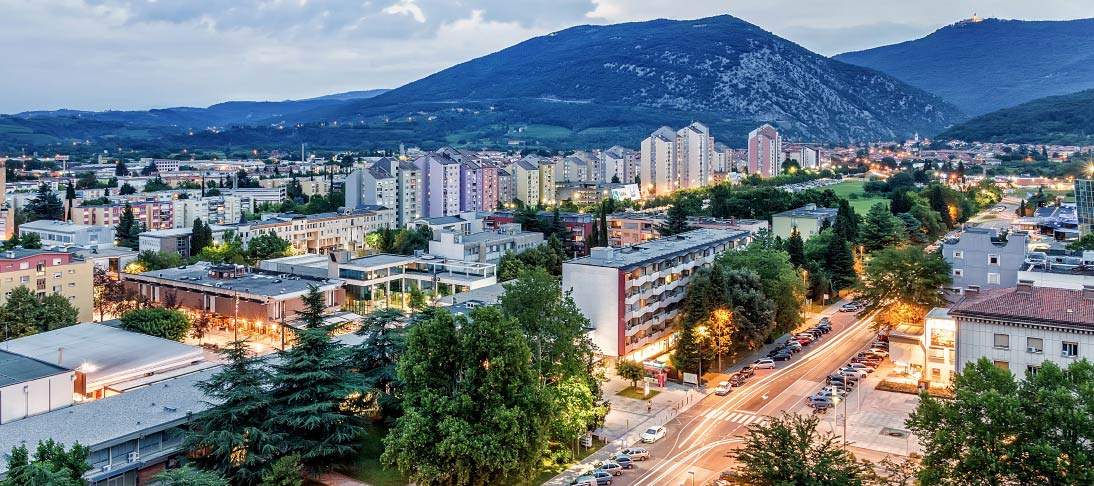Gorica to be European Capital of Culture 2025 along with Slovenia's Nova Gorica
The European Capital of Culture 2025 will be half Italian: the award for 2025 in fact belonged to Slovenia, which had nominated the city of Nova Gorica, but the committee also includes Gorizia, since the two cities are each other’s counterparts and are linked not only by territorial continuity (Nova Gorica, literally “New Gorica,” is practically the extension of Gorizia on Slovenian soil), and separated only by the state border, but also maintain very close economic, social, labor, and cultural relations. The twin cities prevailed over the other five candidates (the capital Ljubljana and the cities of Kranj, Lendava, Piran and Ptuj) to the great satisfaction of the two countries and the cities’ mayors, Rodolfo Ziberna and Klemen Miklavic.
“Today,” said Ziberna, “not only Gorizia and Nova Gorica won, but Europe won.” He was echoed by the president of the Friuli-Venezia Giulia region, Massimiliano Fedriga, who said it was “a well-deserved triumph that fills with satisfaction not only the cities once again united in this common goal, but the entire Friuli-Venezia Giulia region, which will not fail to benefit and grow from this opportunity.” For Miklavic, “winning the title is an opportunity for the entire region, which has its own cross-border dimension.”
The nomination of the two cities represents a unicum so far, because never before has the title of European Capital of Culture been the preserve of an area spanning two neighboring countries. By many, the title is seen as an award of considerable symbolic significance-Nova Gorica was in fact born in 1947, after the Treaty of Paris assigned a portion of the province of Gorizia to Yugoslavia, dividing a territory that had been united for centuries, and splitting the city of Gorizia into two parts as well, since many buildings fell on Yugoslav territory. The largest part of Gorizia had remained in Italy, however, and a major administrative center had been lost in that area of Slovenia: hence, the decision to found a city, which today has about thirteen thousand inhabitants (it has thirty-four thousand instead).
The two mayors waited for the European Union’s verdict in Piazza Transalpina, the square on which the station of the same name stands, which was assigned to Slovenia after the war: a wall, the Gorizia Wall, was erected to separate it from Gorizia, which was torn down only in 2004, when Slovenia joined the European Union, and since then the square, which is located exactly on the border, has been a symbol of peace and cooperation between the two countries.
“After Maribor in 2012,” said Mariya Gabriel, European Commissioner for Innovation, Research, Culture, Education and Youth, “Nova Gorica will be the second Slovenian city to receive the title of European Capital of Culture, in 2025. Hosting a European Capital of Culture is a wonderful opportunity for a city and its surroundings to bring culture to the heart of their communities, and for citizens to discover the rich diversity of cultural expressions in the European Union and beyond. Covid-19 has impacted our lives in a very big way and has affected several sectors, especially that of culture and creativity. I am convinced that the title of European Capital of Culture can help revive the sector, and I hope Nova Gorica can reap the long-term cultural, economic and social potential inherent in the title. I also hope that the title represents a light at the end of the tunnel and spurs the spirit of the citizens to prevail in these challenging times.”
As is the case most years, there will not be just one capital city: in fact, two have been designated for 2025. In addition to Nova Gorica-Gorizia, the German city of Chemnitz, named last Oct. 28, will also bear the title.
In the photo: view of Nova Gorica
 |
| Gorica to be European Capital of Culture 2025 along with Slovenia's Nova Gorica |
Warning: the translation into English of the original Italian article was created using automatic tools. We undertake to review all articles, but we do not guarantee the total absence of inaccuracies in the translation due to the program. You can find the original by clicking on the ITA button. If you find any mistake,please contact us.




























